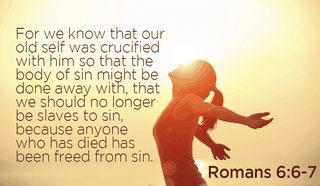
- Recent Translations
- All Translations
Romans 6:10
Share
Settings
Images for Romans 6:10

Romans 6:10 Meaning and Commentary
For in that he died
The death of Christ was settled and agreed to in the covenant and council of peace; it was spoken of by the prophets, and typified by sacrifices; Christ came into the world in order to die, and actually did die the death of the cross; in which the great love of God and Christ is expressed to us; and which is a fundamental article of the Christian faith: and when he died,
he died unto sin once:
he died to that, which we by nature are dead in, and could never make atonement for; which he himself never lived in, and which men naturally love to in; and which had he not died for, we must have died for to all eternity; and he died not for any sin of his own, or of angels, nor for the sins of every man, but for the sins of his people; it may be rendered, he died in sin: in the likeness of sinful flesh, in which he was sent; having as a surety sin laid on him, and bore by him, and for which he was wounded, bruised, and died: or rather to sin; that is, to make atonement for it, procure the pardon of it, take it away, and utterly abolish it: and this he did "once"; this is observed, in reference to the repeated sacrifices of the old law, which could never expiate or remove sin; and to show, that Christ's dying once was enough, his sacrifice was fully satisfactory to the law and justice of God:
but in that he liveth:
which must be understood, not of his life as God, but as man; and that not on earth, but in heaven; where he lives with God, at the right hand of God, and by him, by the power of God: and
he liveth unto God;
to his glory, and to make intercession for us.